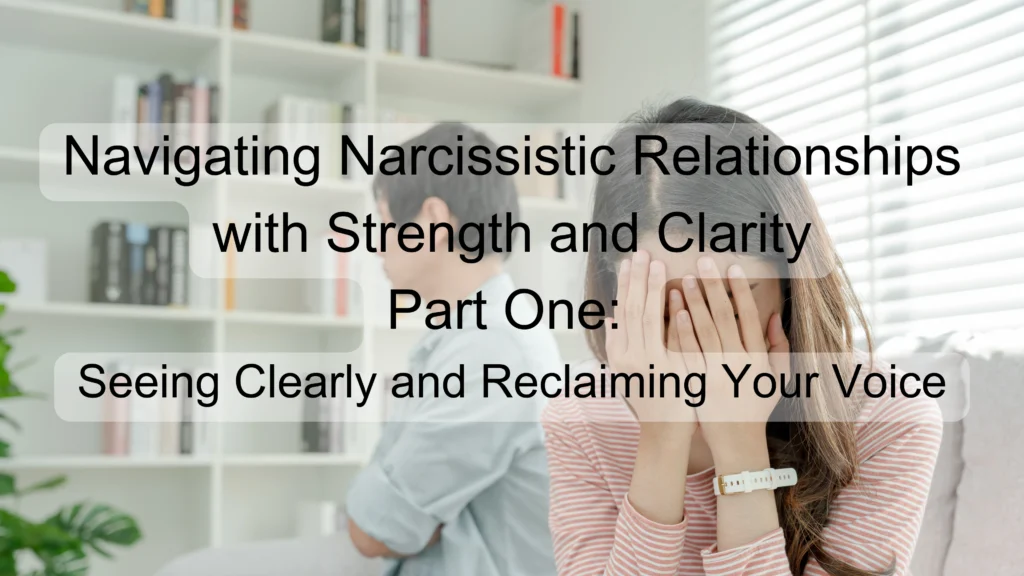Navigating Narcissistic Relationships with Strength and Clarity
Part One: Seeing Clearly and Reclaiming Your Voice
Over the years, the term narcissism has become a kind of modern-day curse word—used to describe everything from self-centred behaviour to full-blown personality disorders. Social media is awash with warnings: “Get out!” “They’ll never change!” “Run while you can!” These may sound dramatic, but for many, they echo real pain.
However, there’s a more balanced—and ultimately more empowering—way to understand what’s going on when we find ourselves entangled in a relationship with a narcissistic individual. Dr. Craig Malkin’s book Rethinking Narcissism helps us see that narcissism is not a monolithic label, but a spectrum. Some people may have just a few traits, others may be deeply wounded and emotionally disconnected, and others may be dangerous and completely without empathy.
But this post isn’t about them.
It’s about you.
If you’ve been involved with someone who has narcissistic traits—whether they were subtle or severe—this is your space to begin healing, reclaiming your sense of self, and learning to navigate future relationships with clearer eyes and stronger boundaries.
Let’s explore the tools you can carry as you rebuild your life.
1: Learn to Spot Healthy vs. Unhealthy Narcissism
The first and most important insight is that narcissism isn’t always a bad thing. In fact, we all need a healthy dose of it to thrive. A person with healthy narcissism can accept praise without fishing for it, feels proud of their achievements without needing to boast, and can engage in mutual relationships without needing to dominate.
However, when narcissism turns unhealthy, it evolves into entitlement, manipulation, and exploitation. We must learn to identify these red flags—not to judge, but to protect ourselves.
Think about your past relationship: was your partner able to listen to your needs, or did they always make it about them? Were they open to feedback, or did they explode with rage or retreat into silent treatment? Did you feel like you were walking on eggshells, fearing their reactions?
Unhealthy narcissism often reveals itself over time, not necessarily in the charming early stages. The inability to apologise, constant need for admiration, lack of empathy, and repeated boundary violations indicate that someone is operating from a wounded, inflated sense of self.
Learning to identify these patterns makes you less likely to override your intuition. You start to trust your gut again. And that is the beginning of reclaiming your voice.
2: Protect Yourself with Boundaries and Clarity
Many people coming out of narcissistic relationships say, “I didn’t know how to set boundaries,” or “Every time I tried, they pushed right past them.” This is not your fault. You may have been conditioned—through trauma, childhood dynamics, or a lifetime of people-pleasing—to believe that setting limits is selfish or unkind.
But boundaries are not punishments. They are acts of clarity.
A boundary signifies, “This is where I end and you begin.” It helps you recognise what you’re responsible for—and what you’re not. In day-to-day life, this might look like refusing to answer calls during your self-care time, declining unreasonable demands, or simply expressing your needs without apologising for them.
Healthy boundaries create safety in intimate relationships. Without them, intimacy is impossible because intimacy requires mutual respect. A narcissistic partner may attempt to undermine your boundaries with charm, guilt, or rage. They may accuse you of being cold, selfish, or unfair. That’s because they are not used to hearing “no.”
Your task is to stay steady. Expect resistance. And remember: the more someone reacts to your boundary, the more important that boundary is.
If you’re recovering from narcissistic abuse, start small. Choose one area of your life—perhaps concerning communication or personal time—and define what feels right. Practice maintaining that boundary. Pay attention to what arises in your body and thoughts. There may be fear, guilt, or anxiety. Allow those feelings to exist, but do not let them take charge.
You are not doing something wrong by asserting yourself. You are doing something brave.
3: Engage with Empathy Without Losing Yourself
Here’s where it gets tricky. Many of us who have been in relationships with narcissistic individuals are naturally empathic. We feel deeply, tune into others, and want to help. We believe that if we love someone enough, they’ll change.
But empathy, when misapplied, can become a trap.
Dr. Malkin teaches us that you can have compassion for someone’s pain without enabling their behaviour. You can understand someone’s wounds without allowing yourself to be wounded by them.
Empathy without boundaries is self-abandonment.
So, how do you love without losing yourself? You begin by shifting your internal script. Instead of thinking, “They’re acting this way because they’re hurt, and I need to fix it,” you begin to say, “They’re acting this way because they’re hurt—but their healing is not my responsibility.”
In practice, this could involve listening with kindness while refusing to tolerate emotional abuse. It could entail validating their feelings without accepting blame. It may also require walking away from arguments intended to confuse or shame you, rather than to resolve any issues.
The old you may have bent over backwards to make someone feel better, even when it hurt you. The new you learns to say, “I see your pain. But I matter, too.”
Coming Next in Part Two:
In the second part of this blog post, we will dive into the final and perhaps most difficult truth—knowing when it’s time to walk away, and how to do so in a way that honours your healing, your dignity, and your future. We will also explore what it means to step into your own strength, rebuild your identity, and find your centre again after chaos.
You do not have to live in reaction to someone else’s dysfunction. You are allowed to rise. And you will.
Find more recommended reading here
Wondering what to read next? Why not try When Sobriety Isn’t Enough: Choosing Recovery for Yourself

